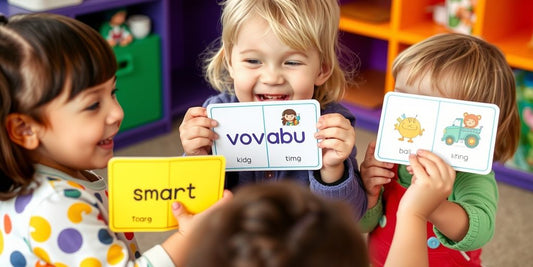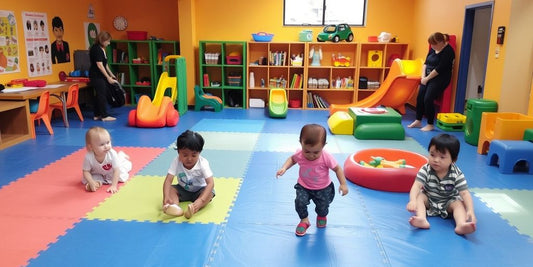Consistency is one of the most important tools in a parent's toolkit. It helps children feel safe and secure, knowing what to expect from their environment. For new parents, understanding the value of consistency can make a big difference in how they approach daily routines, discipline, and overall parenting strategies. This article explores why consistency is crucial in parenting and offers practical tips for maintaining it.
Key Takeaways
- Consistency helps children feel safe and secure by providing a predictable environment.
- It builds trust between parents and children, making discipline more effective.
- Consistent routines and rules help children develop self-discipline and emotional regulation.
- Inconsistent parenting can lead to confusion and increased behavioral issues.
- While consistency is key, it's also important to know when to be flexible and adapt to special circumstances.
The Importance of Consistency in Early Childhood
Building a Secure Environment
Consistency means following through with what we say we will do. It gives power to our words. When children know what to expect, they feel safe and secure. A consistent schedule helps your child feel safe and secure and avoid challenging behavior. This sense of security is crucial for their early development.
Establishing Trust and Predictability
When parents are consistent, children learn to trust them. They know that their parents will respond in predictable ways. This predictability helps children feel more confident and less anxious. Teachers' emotional support consistency is an important predictor of children's academic and social outcomes.
Fostering Emotional Regulation
Children learn to control their emotions better when they know what to expect. Consistent routines and expectations help them understand the consequences of their actions. This understanding helps them regulate their emotions and behaviors more effectively. Kids are just as resilient when consistency and structure is a part of their daily life.
How Consistency Shapes Behavior
The Role of Positive Reinforcement
Consistency in parenting helps children learn quickly. When parents consistently reward positive behavior, children are more likely to repeat those actions. Positive reinforcement can be as simple as praising a child for completing their homework or giving them extra playtime for good behavior. This approach helps children understand what is expected of them and encourages them to meet those expectations.
Avoiding Mixed Signals
Mixed signals can confuse children and make it difficult for them to understand what is right or wrong. If a child receives different responses to the same behavior, they may become unsure of how to act. For example, if one parent allows a child to eat sweets before dinner while the other does not, the child will be confused about the rule. Consistency ensures that children receive clear and uniform messages, helping them to develop a strong sense of right and wrong.
Long-term Behavioral Benefits
Consistency in parenting leads to long-term behavioral benefits. Children who experience consistent rules and expectations are more likely to develop better self-esteem and emotional regulation. They learn to trust their environment and the people around them, which fosters a sense of security. Over time, these children are more likely to exhibit positive behaviors and become responsible, independent individuals.
Consistency is the key to shaping a child's behavior effectively. It provides a solid foundation for children to understand and meet expectations, leading to a more harmonious and well-adjusted family life.
Strategies for Maintaining Consistency

Setting Clear Expectations
Consistency means following through with what you say. This gives power to your words and helps set boundaries. When you communicate your expectations clearly, children understand what is expected of them. This can be done by using age-appropriate language and providing explanations for why certain rules exist.
Creating and Sticking to Routines
Routines provide a sense of security and predictability. When children know what to expect, they feel safe and are better able to manage their emotions. Establishing daily routines, such as bedtime and mealtime, helps children understand the structure of their day. This is similar to how the momease care baby seat™ offers a comfortable and safe space for babies, making routines easier to follow.
Handling Public Situations
Public situations can be challenging, but maintaining consistency is crucial. If a child knows that certain behaviors are expected regardless of the setting, they are more likely to behave appropriately. For example, if a child knows they won't get a treat by making a fuss in a store, they are less likely to try that tactic. This is similar to how momease care smart cards™ help children learn through consistent reinforcement, making learning enjoyable and predictable.
Consistency in parenting helps children feel secure and understand what is expected of them. It builds a foundation for them to manage their emotions and behaviors effectively.
By setting clear expectations, creating routines, and handling public situations consistently, parents can provide a stable environment that fosters positive behavior and emotional well-being.
Challenges to Consistent Parenting
Dealing with Parental Fatigue
Parenting is exhausting, especially for new parents. Lack of sleep and constant demands can make it hard to stay consistent. When you're tired, it's easy to give in to your child's demands just to get a moment of peace. This can lead to inconsistency, which can increase difficult behavior in children.
Managing Different Parenting Styles
No two parents are exactly alike, and this can lead to challenges in maintaining consistency. One parent might be more lenient, while the other is stricter. It's important to communicate and agree on the big issues to avoid sending mixed signals to your child. This can be especially challenging when dealing with extended family members who may have different views on parenting.
Navigating External Influences
External influences, such as advice from friends or parenting trends, can also make it difficult to stay consistent. It's important to stay true to your parenting values and not be swayed by outside opinions. This can be particularly challenging when your child is exposed to different rules and expectations in various settings, such as school or daycare.
Consistency in parenting takes energy and internal resources. Take a break, eat well, and exercise. No one is a calm, consistent parent when they are stressed-out and frazzled.
Sibling Rivalry
Managing conflicts and promoting positive sibling relationships can be a recurring challenge for parents. It's important to apply rules consistently to all children to avoid feelings of favoritism or unfairness. This can help reduce sibling rivalry and promote a more harmonious household.
When Flexibility is Necessary
Recognizing Special Circumstances
There are times when sticking to a routine isn't the best choice. Life events like moving, starting school, or welcoming a new sibling can be overwhelming for a child. During these moments, it's important to adjust and be more flexible. This doesn't mean abandoning all rules, but rather, understanding that some situations require a different approach.
Balancing Consistency and Adaptability
While consistency is crucial, there are moments when flexibility is equally important. For instance, if your child is sick or having a particularly tough day, it might be best to ease up on certain expectations. The key is to maintain a balance between being consistent and knowing when to adapt. This balance helps children feel secure while also teaching them to handle changes.
Making Informed Exceptions
Sometimes, you need to make exceptions to your usual rules. This could be due to special events, holidays, or family gatherings. When making these exceptions, it's essential to communicate clearly with your child about why the rules are different this time. This helps them understand that while rules are important, there are valid reasons for occasional changes.
Consistency Across Different Caregivers
Ensuring consistency in parenting is crucial, but it becomes even more challenging when multiple caregivers are involved. Here are some strategies to help maintain a consistent approach across different caregivers.
Aligning with Your Partner
It's essential to be on the same page with your partner regarding parenting strategies. Setting clear boundaries and expectations for family members who assist in caregiving can help maintain consistency in parenting style. Regular discussions and agreements on key issues can prevent mixed signals and confusion for the child.
Coordinating with Extended Family
Grandparents, aunts, uncles, and other extended family members often play a significant role in a child's life. By working together with these family members, parents can ensure that the same rules and routines are followed, even when the child is not at home. This collaboration helps in creating a secure and predictable environment for the child.
Ensuring Consistency in Childcare Settings
When children are in daycare or with babysitters, it's important to communicate your parenting style and expectations clearly. Providing caregivers with a detailed outline of routines, rules, and consequences can help maintain consistency. This approach ensures that the child experiences a stable and predictable environment, regardless of the setting.
Consistency in parenting is not just about following the same rules but also about creating a sense of security and predictability for the child. This stability helps in fostering emotional regulation and trust.
By aligning with your partner, coordinating with extended family, and ensuring consistency in childcare settings, you can create a cohesive and supportive environment for your child's growth and development.
The Psychological Impact of Consistent Parenting
Boosting Self-Esteem and Confidence
When parents are consistent, children know what to expect. This predictability helps them feel secure and valued. Consistent praise and attention can boost a child's self-esteem, making them feel more confident in their abilities. They learn that their efforts are recognized and appreciated, which encourages them to keep trying and improving.
Reducing Anxiety and Stress
Children thrive in environments where they understand the rules and know what to expect. Consistency in parenting reduces uncertainty, which in turn lowers anxiety and stress levels. When children know the boundaries and the consequences of their actions, they feel more in control and less anxious about the unknown.
Promoting Independence and Responsibility
Consistent parenting helps children understand the link between actions and consequences. This understanding fosters a sense of responsibility and independence. They learn that their choices matter and that they have control over the outcomes. This sense of control is crucial for developing independence and making informed decisions.
Consistency in parenting is not just about following rules; it's about creating a stable environment where children can grow and thrive. It helps them feel secure, valued, and in control of their lives.
Conclusion
In the journey of parenting, consistency stands out as a cornerstone for raising well-adjusted children. By sticking to clear rules and predictable responses, parents provide a stable environment where kids can thrive. While it might be challenging to maintain consistency every day, especially when life gets hectic, the benefits are undeniable. Children learn faster, feel more secure, and develop better behavior patterns when they know what to expect. Remember, it's not about being perfect but about being reliable. So, take a deep breath, plan ahead, and strive for consistency. Your efforts will pay off in the long run, helping your child grow into a confident and well-behaved individual.
Frequently Asked Questions
Why is consistency important in early childhood?
Consistency helps create a stable environment, builds trust, and aids in emotional regulation for young children.
How does consistency shape a child's behavior?
Consistent positive reinforcement and clear expectations help children learn appropriate behaviors and avoid confusion.
What are some strategies for maintaining consistency in parenting?
Setting clear rules, sticking to routines, and planning ahead can help maintain consistency.
What challenges might parents face in being consistent?
Parents often deal with fatigue, differing parenting styles, and external influences that can make consistency difficult.
When is flexibility necessary in parenting?
Flexibility is important in special circumstances, such as when a child is sick or facing unique challenges.
How can parents ensure consistency across different caregivers?
Communication and alignment with partners, extended family, and childcare providers are key to maintaining consistency.









